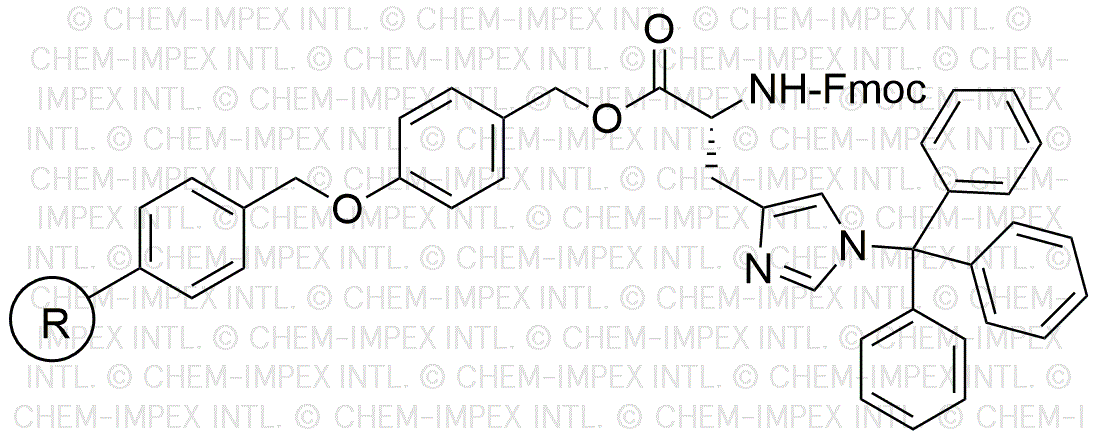Na-Fmoc-Nim-trityl-D-histidine 4-alkoxybenzyl alcohol resin is widely utilized in research focused on:
- Peptide Synthesis: This resin is essential for solid-phase peptide synthesis, allowing researchers to create complex peptides efficiently. Its unique structure facilitates the attachment and detachment of amino acids, streamlining the synthesis process.
- Drug Development: In pharmaceutical research, this resin aids in the development of peptide-based drugs. Its ability to form stable linkages enhances the formulation of therapeutic agents targeting specific diseases.
- Bioconjugation: The resin is used in bioconjugation techniques, where peptides are linked to other biomolecules. This is crucial for creating targeted drug delivery systems, improving the efficacy of treatments.
- Research in Cancer Therapy: Researchers utilize this resin to develop peptides that can inhibit cancer cell growth. Its application in creating specific inhibitors can lead to breakthroughs in cancer treatment.
- Protein Engineering: In the field of protein engineering, the resin is employed to modify proteins for enhanced functionality. This is particularly beneficial in creating proteins with improved stability and activity for various industrial applications.
General Information
Properties
Safety and Regulations
Applications
Na-Fmoc-Nim-trityl-D-histidine 4-alkoxybenzyl alcohol resin is widely utilized in research focused on:
- Peptide Synthesis: This resin is essential for solid-phase peptide synthesis, allowing researchers to create complex peptides efficiently. Its unique structure facilitates the attachment and detachment of amino acids, streamlining the synthesis process.
- Drug Development: In pharmaceutical research, this resin aids in the development of peptide-based drugs. Its ability to form stable linkages enhances the formulation of therapeutic agents targeting specific diseases.
- Bioconjugation: The resin is used in bioconjugation techniques, where peptides are linked to other biomolecules. This is crucial for creating targeted drug delivery systems, improving the efficacy of treatments.
- Research in Cancer Therapy: Researchers utilize this resin to develop peptides that can inhibit cancer cell growth. Its application in creating specific inhibitors can lead to breakthroughs in cancer treatment.
- Protein Engineering: In the field of protein engineering, the resin is employed to modify proteins for enhanced functionality. This is particularly beneficial in creating proteins with improved stability and activity for various industrial applications.
Documents
Safety Data Sheets (SDS)
The SDS provides comprehensive safety information on handling, storage, and disposal of the product.
Product Specification (PS)
The PS provides a comprehensive breakdown of the product’s properties, including chemical composition, physical state, purity, and storage requirements. It also details acceptable quality ranges and the product's intended applications.
Certificates of Analysis (COA)
Search for Certificates of Analysis (COA) by entering the products Lot Number. Lot and Batch Numbers can be found on a product’s label following the words ‘Lot’ or ‘Batch’.
*Catalog Number
*Lot Number
Certificates Of Origin (COO)
This COO confirms the country where the product was manufactured, and also details the materials and components used in it and whether it is derived from natural, synthetic, or other specific sources. This certificate may be required for customs, trade, and regulatory compliance.
*Catalog Number
*Lot Number
Safety Data Sheets (SDS)
The SDS provides comprehensive safety information on handling, storage, and disposal of the product.
DownloadProduct Specification (PS)
The PS provides a comprehensive breakdown of the product’s properties, including chemical composition, physical state, purity, and storage requirements. It also details acceptable quality ranges and the product's intended applications.
DownloadCertificates of Analysis (COA)
Search for Certificates of Analysis (COA) by entering the products Lot Number. Lot and Batch Numbers can be found on a product’s label following the words ‘Lot’ or ‘Batch’.
*Catalog Number
*Lot Number
Certificates Of Origin (COO)
This COO confirms the country where the product was manufactured, and also details the materials and components used in it and whether it is derived from natural, synthetic, or other specific sources. This certificate may be required for customs, trade, and regulatory compliance.

